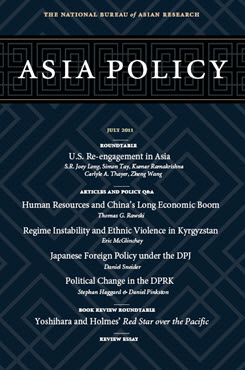The New Asianism
Japanese Foreign Policy under the Democratic Party of Japan
This article examines the foreign policy views of the Democratic Party of Japan (DPJ), from the party’s founding through its first year in power.
EXECUTIVE SUMMARY
MAIN ARGUMENT
In 2009 the DPJ came to power in Japan, ending a half-century of conservative rule, with the hope of reshaping the post–Cold War order by rebalancing Japanese policy with a greater emphasis on Asia, inspired by a “new Asianism.” Instead, the party’s first year in office was marked by foreign policy tensions—first with the U.S. over bases in Okinawa, followed by clashes with China in the Senkaku Islands. The DPJ has moved painfully along the learning curve from opposition politics to the realities of governance. On both sides of the Pacific, policymakers now believe the rocky transition has led to a restoration of the postwar consensus, particularly regarding the U.S.-Japan security relationship. But it would be wrong to conclude that DPJ policies, shaped during the party’s formative years by key leaders who remain largely in place, have been simply thrown aside. The new Asianism, which should not be understood as a “pro-China” shift but rather as an effort to manage the rise of China, remains a core identity of the DPJ.
POLICY IMPLICATIONS
- There is a real danger that relations between Japan and the U.S. could slide again into a morass. Avoiding that outcome requires a more serious effort to understand the underlying foreign policy identity of the DPJ and dispel illusions about the nature of change in Japan.
- Rather than seeing the new Asianism as only a threat, policymakers should view it as an opportunity to jointly, and in concert with South Korea, reshape the security order in Northeast Asia.
- The DPJ’s interest in an East Asian community potentially challenges China for leadership of future regional structures. The party’s focus on Asia, including ties with countries such as India, Vietnam, South Korea, and Australia, could create a security structure in Asia that can cope with the rise of China’s power.
- The mechanism and basis for dialogue is weaker than ever in the U.S.-Japan alliance. The relationships built up over decades of rule by the Liberal Democratic Party need to be revitalized to adapt to a new era in Japanese politics.
About Asia Policy
Asia Policy is a peer-reviewed scholarly journal presenting policy-relevant academic research on the Asia-Pacific that draws clear and concise conclusions useful to today’s policymakers. Asia Policy is published quarterly in January, April, July, and October and accepts submissions on a rolling basis. Learn more


